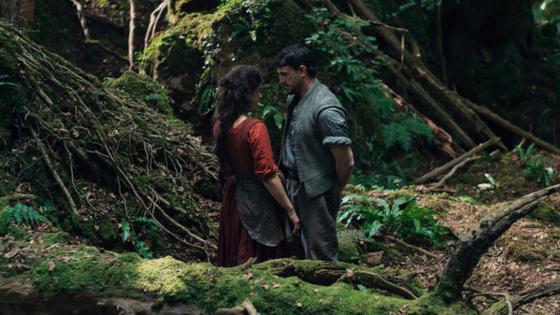Movie review: 'Hamnet' a deeply sad, utterly beautiful Shakespearean story
Published in Entertainment News
Enveloped in soft green, the forest holds Agnes (Jessie Buckley) with the comfort and safety of a womb. Curled up in a centuries-old tree root, she is cradled by the lineage of her mother and the mothers before her, who walked out of the forest knowing of plants and dirt and animals. When she strides out of the woods in her red dress, a powerful hawk on her arm, a young tutor peering out of an attic classroom window is struck dumb at the sight of her. A man of words and letters, William (Paul Mescal) doesn’t quite know what to say.
This William, you’ve heard his words before. He is William Shakespeare, and in Chloé Zhao’s “Hamnet,” which she adapted from the award-winning 2020 novel with author Maggie O’Farrell, she posits an idea: what if William Shakespeare was a hunk? Not just a hunk but one of Mescal’s quality: brooding, brutish, intense, impulsive, sexy.
The pair doesn’t waste any time: they kiss before they know each other’s names; he paces anxious circles while proposing to her; they celebrate their promise atop a table covered with apples. Zhao roots ink-stained intellectual William and his wild, witchy wife Agnes in all of their earthy, embodied sensuality, born of cool moss and moist caves, a warmed hearth and a home they are determined to fill with laughter, not pain. Then their story takes flight, to other planes of existence beyond their control, like a hawk circling the sky, so close but so far away.
About the title: a quote at the beginning tells us that “Hamnet” is the same name as “Hamlet,” an interchangeable spelling of the era. Hamnet was the real son of William Shakespeare, the twin brother of Judith. Not much is known about him, except that he died as a boy. O’Farrell’s novel, and Zhao’s film, imagines the emotional life of Agnes and William before and after his death, before they are unimaginably broken, and after, and how Shakespeare transmuted his grief into his masterpiece, “Hamlet.”
If “Hamlet” is Shakespeare’s, “Hamnet” belongs to Agnes — and to Buckley, assuredly, fierce and full of love. Even though we know what’s coming, we still hope against hope that it won’t happen that way. Agnes sees, psychically, that she will have two children at her deathbed, even though she gives birth to three, and Hamnet has a face like a ray of sunshine, chubby-cheeked and golden, played by the wondrous young actor Jacobi Jupe. He is smart and playful, the planet around which his family orbits. When his father asks him to be brave, he fulfills that promise, tragically.
Agnes, so present in nature, her home, with her children, and with the unpredictable rhythms and rhyme of life and death, is filled with rage and resentment as Will retreats back to London to work. When she’s handed a notice for his new tragedy, “Hamlet,” she is rattled, almost panic-stricken. What she discovers on the stage of the Globe Theatre, embodied by a young main in painted yellow hair (Noah Jupe, Jacobi’s older brother), is a parable that reckons with death and grief, the ghost of a father played by her husband in white grease paint. With “Hamlet,” they manage to see each other’s pain, to know it.
And so, like many films this year, “Hamnet” is about the cathartic power of art; as a portal to emotion, as a way to say the things that can’t be said, sincerely, face-to-face, and Zhao conveys that with an unapologetically earnest and stripped-bare emotion — guileless, unafraid.
Within Zhao’s artistic portal that is “Hamnet,” Buckley is otherworldly: channeling something that feels ancient, mysterious, unknowable. Mescal is similarly inscrutable at times, only rarely allowing William’s emotion to physically surface, rather, pouring it onto the stage.
Zhao is smart to showcase these performances with a restrained structure and style. She composes thoughtful images with her cinematographer Lukasz Zal, utilizing slow pans to lead the characters and the audience through the space, and the narrative, the repeated motif illustrating what is there and not there.
There are a few leading moments where Zhao slightly overplays it, filling gaps that don’t need filling. As William, grief-stricken, intones the words, “to be or not to be,” like a suicide note instead of philosophical inquiry, it’s a bit overwrought. Max Richter’s score is stunning, but the first notes of his familiar “On the Nature of Daylight” inspire a Pavlovian emotional response.
It’s when Zhao keeps it simple that “Hamnet” shines: in a hand extended, a gaze met. The film is deeply sad, devastating and utterly beautiful in what it conveys about what it means to love someone so much that their absence can crack the world. Art can’t repair that, but it can say what cannot be said, to cleanse the soul with tears.
———
'HAMNET'
3.5 stars (out of 4)
MPA rating: PG-13 (for thematic content, some strong sexuality, and partial nudity)
Running time: 2:05
How to watch: Now in theaters
———
©2025 Tribune Content Agency, LLC













Comments